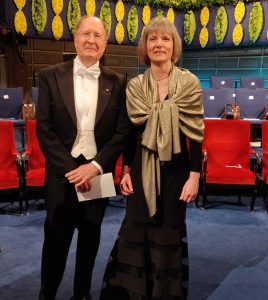Scientists at the Centre for Cancer Immunology have played key roles in immunology research recognised by the 2018 Nobel Prize committee.
┬Ā
At a special ceremony this week in Stockholm, the Nobel Prize for Chemistry was awarded to Americans Frances Arnold and George P Smith and Briton Gregory Winter while the Nobel Prize Medicine was awarded to Professor James P Allison from the US and Professor Tasuku Honjo from Japan.
┬Ā
Professor Allison and Professor HonjoŌĆÖs work led to the development of immune checkpoint therapy.
┬Ā
The immune system protects the body from disease but has built in ŌĆśbreaksŌĆÖ to prevent it from attacking healthy tissue. Cancer takes advantage of this break system and is able to go undetected. However, Professor Allison and Professor Honjo discovered how to cut the breaks on the immune system so it can find and destroy cancer.
┬Ā
Professor Christian Ottensmeier led the Southampton site in a landmark clinical trial that tested this discovery ŌĆō it was the first large trial of the anti-CTLA4 antibody known as ipilimumab and showed an improvement in overall survival among patients with skin cancer.
┬Ā
Southampton also recruited for another patient trial testing ipilimumab. Charlotte Moss took part in that trial after being diagnosed with melanoma in 2011. The trial was recently unblinded revealing she had received the drug.
┬Ā
Charlotte said: ŌĆ£I was exceptionally lucky that I was part of the trial. I am now cancer-free and have dreams and aspirations for a fulfilling future ahead of me. When I heard the news that this research won the Nobel prize I was blown away. It was incredible to me, that an idea born over 20 years ago, not only has now won the highest prize in science, but it saved my life.ŌĆØ
┬Ā
Professor Sally Ward, who joined the Centre this summer from Texas A&M University, worked with Sir Greg Winter for two and a half years at the Medical Research Council Laboratory of Molecular Biology in the late 1980s.

┬Ā
During this time, she contributed to the body of work that led to the award of the Nobel prize to Winter. This work involved the development of ŌĆśtest-tube evolutionŌĆÖ approaches to isolate antibodies that bind to specific targets such as inflammatory molecules and tumour markers.
┬Ā
These approaches are now widely used in biopharma to isolate antibodies of therapeutic potential and have resulted in the generation of blockbuster drugs such as the arthritis drug, Humira.
┬Ā┬Ā
Professor Ward, who attended the Nobel ceremony as a guest of Sir Greg Winter, said: ŌĆ£I was delighted to hear that Greg had won the Nobel Prize. The winners of the Chemistry prize cover an excellent combination of related areas. ItŌĆÖs great to see this level of recognition for the fundamental basic science that is now making a difference to human health.ŌĆØ
┬Ā
Since working with Sir Winter, Professor Ward has gone on to run her own labs and is now a senior group leader at the Centre for Cancer Immunology to set up an interdisciplinary laboratory with physicist and super-resolution microscopy expert Professor Raimund Ober. Together they are investigating the mechanism of action of immunotherapeutic antibodies and discovering new ways of engineering them to be more efficient.